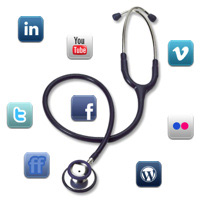There has been a lot made of the latest report from the Pew Research Center’s Internet & American Life Project. In short, new data from the group led by @susannahfox suggests that:
35% of U.S. adults have gone online to figure out a medical condition
The internet is a de facto second opinion – and even first opinion – for many people
There has been a lot made of the latest report from the Pew Research Center’s Internet & American Life Project. In short, new data from the group led by @susannahfox suggests that:
35% of U.S. adults have gone online to figure out a medical condition
The internet is a de facto second opinion – and even first opinion – for many people
I have written in depth about the opportunities and possible benefits that arise from being engaged and empowered in one’s own health, and similar benefits may arise by becoming engaged and empowered in a loved one’s health. I believe wholeheartedly in this evolution to an era of personalized and peer-to-peer healthcare.
But the question remains, what skill set makes for an effective ‘online diagnoser’? Taken more broadly the question must be asked, how can we prepare the general populace to effectively become so empowered?
These are the questions I try to answer in #SocialQI: Simple Solutions for Improving Your Healthcare.
And here is what I propose: There are five critical skills which may ensure that those motivated to become ‘online diagnosers’ can do so safely and effectively – the caveat being that no one should take these skills as being a replacement for building effective relationships with a trained, profession, healthcare team.
Individual Skill #1 – Establishing personal credibility and reputation
Perhaps the most fundamental element of the new online, collaborative models of healthcare is that they are inherently social. There will be more engagement, more interaction, and more conversations. Increasingly contribution to sharing and learning will define one’s reputation in the online healthcare community. As the long-established models of hierarchy begin to change, and the systems become flatter, and as the bottom rungs of the traditional hierarchical ladder gain a greater voice, we will each have to develop new skills for assessing the credibility of information and the reputation of the source.
Individual Skill #2– Filtering, curating, and searching content and context
The closed and disconnected nature of our current healthcare information stream has led to three-, four-, and even five-fold variations in the quality of healthcare that is provided in this country. But if we release the bottleneck by creating new collaborative models of information flow, learning, and healthcare improvement, some might argue that we risk further overwhelming the already overwhelmed. A logical point perhaps, but fortunately it is not as simple as that. If 1) new models accelerating information flow and learning are engineered AND 2) the end users (patients, physicians, and biomedical scientists) are given new controls to filter, curate, and search this information flow, then the bottleneck is released AND a new, manageable, steady state can emerge ― one that I believe, and I think I can prove, will drive us to achieve a higher quality provision of healthcare across the board.
We each have a signal-to-noise level that we are comfortable with and we need to be able to own this, to control the information flow, to set the speed, breadth, and depth of the system.
Individual Skill #3 – Providing and receiving feedback and criticism
The third skill that we, as potential users of online, collaborative models of healthcare need to evolve gets at the very heart of the social nature of the new models ― that is, playing well with others. I could write a dissertation on the topic but I could never say it any better than this: Everything you need to know to participate in online collaborative models of healthcare, you probably learned in kindergarten. In some ways it is just that simple, but I would also add one caveat: In collaboration, getting along should never be as important as getting things done.
The difference between simply being social and being social as a means of becoming empowered in your own healthcare is that the former thrives in the absence of conflict, and the latter thrives because of it. Learning, growth, and improvement only occur when mistakes are made and lessons are learned, and lessons cannot be learned by avoiding conflict. I have seen far more collaborations fail because members were too nice to each other than I have because members were honest and constructive in their criticism.
It is important to remember that although online, collaborative models in healthcare are intrinsically social, they are more importantly “directed”― that is to say that the community has a goal, and the members have a goal. To achieve these goals there are times when the community must redirect itself, when members will disagree, and when feedback will be more critical then congratulatory.
Individual Skill #4 – Accurately assessing one’s own ‘topic’ literacy
The fourth skill is perhaps of the most challenging. To get the most out of new and emerging online, collaborative models for healthcare we must be able to adequately assess our own knowledge base. I say this is perhaps the most challenging because I know from experience (and a preponderance of evidence) that we humans are not necessarily rational beings. We have blind spots and biases that often lead us to see the world in unique ways ― I know my wife loves to hear me admit this.
The good news is that there are two factors working in our benefit. The first is that the open and social nature of these collaborative models for healthcare actually helps in that it provides us with constant feedback and perspective from the community (if we are willing to accept it). The second is that the digital nature of the collaboration ensured that we can revisit conversation, we can “analyze our data” to measure how effective we are at participating and contributing to the system (again, if we are willing to accept it). But still there is a risk that some (probably the people who didn’t buy my book) are all too unaware of their own strengths and weaknesses to find constructive opportunities to engage, to share, or to learn. This is why the third skill related to providing and accepting feedback and criticism and this fourth skill are so tightly linked: Because the best way to accurately assess you own topic literacy is to be open to others in the community to share their perspective and provide constructive feedback to you. If you can find members to help you and you are open to their advice, then you have an infinitely better chance of accurately knowing where you stand.
Individual Skill #5 – Critical thinking and decision making
The final skill that supports our individual participation in online, collaborative models of healthcare builds upon the first four and in many ways it is the keystone to our success. Once we establish the skill to assess credibility and reputation; learn to filter, curate, and search efficiently; once we understand how to give and receive feedback; and learn to effectively assess our own topic literacy; then, finally, we must be able to pull it all together to think critically and make important decisions.
In short, critical thinking requires us to know what we know and simultaneously understand what we don’t know AND not to be paralyzed by the reality that we rarely (if ever) have all of the information we need [another reason to NEVER forego engaging with a trained professional healthcare team]. Then, once we have thought critically through an issue, we must act; therefore, critical thinking and decision making go hand in hand.
As with the other skills, here too the system can help. In as much as we will have access to others who have confronted similar circumstances and made similar decisions before, the open, connected, and social systems will empower the individual to learn from the collective intelligence, dramatically simplifying the challenge of critical thinking and decision making. But the fact that this is challenging in no way negates the necessary reality: The better we each become (patients, physicians, and research scientists) in our ability to critically think through all of the credible evidence and information that we have filtered, curated, and searched, the better able we will be to leverage new collaborative models of healthcare to make decisions that drive healthcare that is safe, timely, effective, efficient, equitable, and patient-centered.
And here is where the ideas from #socialQI become critical to understanding the impact of Pew’s new data: whether the emergence of an engaged class of 35% of US Adults going online to figure out a medical condition is a good thing or not, depends on whether those folks are prepared to do so effectively. Taking on the role of being an ‘online diagnoser’ is ONLY a good thing if these folks have the skills to do so effectively.
What troubles me is that while the opportunity to become an ‘online diagnoser’ is increasingly available, and while the buzz within some corners of the internet is that this is a natural evolution of healthcare, there has been little if any reasonable dialog about what adaptations are critical for this form of evolution to flourish. There has been little-to-any broad discussion about what skill adaptations are requisite.
I applaud @susannahfox and the team at Pew for continuing to systematically explore what is happening within this space, but at the same time I implore the broader community to think critically about how to ensure that this ‘revolution’ is supported in ways that leads to its ultimate success.
Without the broad promotion and adoption of these critical new skills, I have some grave concern about how this will all end…
![]()







